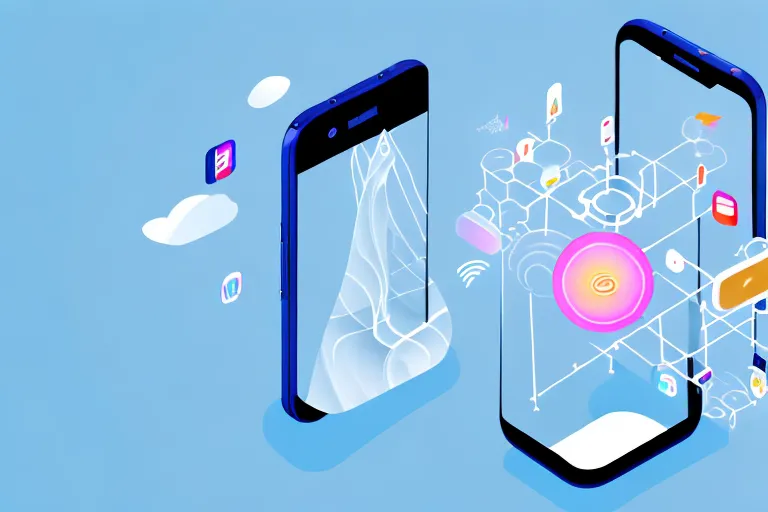The Rise of RCS: How the Ubiquity Revolution is Transforming Mobile Apps

In today's digital age, technology has become an integral part of our daily lives. From smartphones to smart home devices, our world is increasingly connected and accessible. One of the ways this ubiquitous technology is transforming our lives is through the rise of RCS messaging. RCS, or Rich Communication Services, is an enhanced messaging protocol that offers features beyond traditional SMS. With RCS, users can share high-quality images and videos, participate in group chats, and even interact with brands seamlessly. This article explores the impact of the ubiquity revolution and how it is transforming mobile apps.
The Ubiquity Revolution: How Technology is Changing the World
In recent years, technology has rapidly evolved, impacting various aspects of our lives. The ubiquity revolution refers to the increasing prevalence and accessibility of technology in our everyday routines. Thanks to inventions like smartphones and tablets, we are more connected than ever before. This revolution has not only changed the way we communicate but also how we interact with businesses and consume information.
Exploring the Impact of Ubiquitous Technology in Our Daily Lives
Ubiquitous technology has revolutionized the way we approach tasks and interact with the world around us. With smartphones and other mobile devices, we carry the power of the internet in our pockets. We can access information, connect with friends and family, and even manage our finances from virtually anywhere. This level of connectivity has made our lives more efficient, convenient, and interconnected.
Furthermore, the ubiquity revolution has had a profound impact on various industries. For example, in the healthcare sector, technology has enabled remote patient monitoring and telemedicine, allowing doctors to provide virtual consultations and monitor patients' health conditions from a distance. In the education sector, technology has facilitated online learning platforms, making education more accessible to individuals around the world. Additionally, in the transportation industry, the rise of ride-sharing apps and navigation systems has transformed the way we travel, making it easier to navigate unfamiliar places and reducing the reliance on traditional transportation methods.
Moreover, ubiquitous technology has transformed the way we access and consume information. Instead of relying solely on traditional media outlets, we can now source news and entertainment from various online platforms. Social media has become an integral part of our lives, allowing us to connect with others and share our experiences instantaneously. As technology continues to advance, the possibilities for impactful innovation are endless.
The Evolution of Communication: From Dawn to Dusk
Communication has always been a fundamental aspect of human civilization. From cave paintings to smoke signals, we have constantly evolved and refined our methods of exchanging information. Today, we are in the midst of another communication revolution, fueled by the rise of RCS messaging.
RCS messaging builds upon the foundation of SMS, offering a range of enhanced features that revolutionize the way we communicate. With RCS, users can send and receive high-quality images and videos without the need for third-party apps. Group chats become more interactive and engaging, enabling seamless collaboration and coordination. Additionally, RCS allows individuals to interact with businesses, making customer support and engagement more efficient and personalized.
Furthermore, the impact of RCS messaging extends beyond personal communication. In the business world, RCS offers new opportunities for customer engagement and marketing. With features like interactive buttons and suggested replies, businesses can create more immersive and personalized experiences for their customers. Moreover, RCS enables businesses to provide real-time updates and notifications, enhancing the overall customer experience.
As technology continues to advance, the evolution of communication is set to continue. From the introduction of 5G networks to the development of augmented reality communication tools, the future holds exciting possibilities for how we connect and interact with one another.
Unleashing the Potential of SMS Marketing
In the realm of business, marketing plays a crucial role in driving growth and success. As technology evolves, so do the strategies and channels through which businesses can reach their target audience. SMS marketing, in particular, has emerged as a powerful tool for businesses of all sizes.
With the rise of mobile devices and the increasing reliance on smartphones, SMS marketing enables businesses to directly reach their customers' mobile devices, offering a quick and convenient way to deliver targeted messages. Unlike other marketing channels, SMS marketing boasts high open rates and near-instantaneous delivery, making it an effective way to engage customers and drive conversions.
Businesses can leverage SMS marketing to promote products and services, announce special offers, and even deliver personalized notifications. By crafting compelling and concise messages, businesses can establish a direct line of communication with their customers, fostering loyalty and driving sales.
Harnessing the Power of SMS Marketing for Business Success
One of the key advantages of SMS marketing is its ability to cut through the noise and capture customers' attention. Unlike email or social media, where messages can easily get lost or go unnoticed, SMS messages have a higher chance of being seen and read by recipients. This direct and immediate connection with customers allows businesses to deliver time-sensitive information and offers, ensuring that their messages are not only seen but also acted upon.
Furthermore, SMS marketing allows businesses to tap into the power of personalization. By segmenting their customer base and tailoring messages based on demographics, preferences, or past behaviors, businesses can deliver highly targeted and impactful SMS campaigns. This level of personalization not only increases the chances of engagement but also enhances the overall customer experience, making customers feel valued and understood.
Best Practices for Effective SMS Marketing Campaigns
While SMS marketing offers great potential for businesses, it is essential to adhere to best practices to ensure success. Firstly, businesses should obtain explicit permission from customers before sending marketing messages. This not only ensures compliance with regulations but also fosters trust and respect between businesses and their customers. By obtaining permission, businesses can ensure that their messages are welcomed and well-received, rather than being perceived as intrusive or spam.
Secondly, businesses should pay careful attention to the timing and frequency of their SMS campaigns. Bombarding customers with too many messages or sending them at inconvenient times can lead to annoyance and opt-outs. It is crucial to strike a balance and respect customers' boundaries to maintain a positive relationship.
Lastly, businesses should constantly evaluate and optimize their SMS marketing campaigns. By tracking metrics such as open rates, click-through rates, and conversion rates, businesses can identify strengths and areas for improvement, allowing them to refine their strategies and achieve better results over time. Regular analysis and optimization are key to staying ahead in the ever-evolving landscape of SMS marketing.
In conclusion, SMS marketing has become an indispensable tool for businesses seeking to engage customers and drive growth. With its direct and immediate reach, high open rates, and personalization capabilities, SMS marketing offers businesses a powerful channel to connect with their target audience. By following best practices and continuously refining their strategies, businesses can unleash the full potential of SMS marketing and achieve remarkable success.
Demystifying SMS APIs: A Comprehensive Guide
Behind the scenes of SMS marketing and communication lies the power of SMS APIs. SMS APIs, or Application Programming Interfaces, allow businesses to integrate SMS functionalities into their existing systems and workflows. Understanding SMS APIs and how to leverage them is crucial for unlocking the full potential of SMS-based communication.
Understanding the Functionality and Benefits of SMS APIs
SMS APIs provide developers with a set of tools and protocols to seamlessly integrate SMS functionality into their applications or systems. By using SMS APIs, businesses can send and receive messages, track delivery status, and even automate certain actions based on received messages.
The benefits of SMS APIs are numerous. They enable businesses to create custom workflows that align with their specific needs, integrating SMS as part of a larger ecosystem. SMS APIs also provide enhanced security and reliability over traditional SMS gateways, ensuring that businesses can deliver messages to their customers without interruption.
How to Integrate SMS APIs into Your Business Operations
Integrating SMS APIs into existing business operations can seem daunting, but it doesn't have to be. Many providers offer comprehensive documentation and development kits that guide businesses through the integration process.
Businesses should start by identifying their specific use case for SMS APIs and the desired outcomes. Whether it's streamlining customer support or automating appointment reminders, clarifying objectives will help guide the integration process.
Next, businesses should choose a reliable SMS API provider that aligns with their needs and requirements. Providers typically offer user-friendly interfaces, code samples, and support resources to assist businesses in implementing SMS APIs effectively.
The Future of Mobile Communication: RCS Messaging
While SMS and SMS APIs continue to be crucial communication tools, the future of mobile communication lies in the evolution of RCS messaging. RCS messaging offers an enhanced messaging experience that combines the simplicity and ubiquity of SMS with the rich multimedia capabilities of popular messaging apps.
Unlocking the Potential of RCS Messaging for Enhanced User Experience
RCS messaging aims to provide users with a more immersive and interactive messaging experience. With features like read receipts, typing indicators, and the ability to share high-quality media, RCS messaging bridges the gap between traditional SMS and over-the-top messaging apps.
Brands can leverage RCS messaging to create engaging experiences for their customers, whether through interactive marketing campaigns or seamless customer support. The rich functionality of RCS messaging opens up exciting possibilities for businesses to connect with their audience in a more meaningful way.
Exploring the Features and Advantages of RCS Messaging
RCS messaging offers several key features that set it apart from traditional SMS. Besides the ability to share high-quality images, videos, and audio, RCS messaging supports group chats with enhanced capabilities, such as real-time collaboration and media sharing. Users can also engage in conversational commerce, interacting with businesses directly within the messaging platform.
Furthermore, RCS messaging provides a more visually appealing user interface, complete with read receipts, typing indicators, and other interactive elements. This enhanced user experience leads to higher engagement, increased customer satisfaction, and ultimately, stronger relationships between businesses and their customers.
As the ubiquity revolution continues to shape the mobile app landscape, the rise of RCS messaging stands as a testament to the ever-evolving nature of technology. With its enhanced features and seamless integration with SMS and existing messaging apps, RCS is poised to transform mobile communication and open up new opportunities for businesses to engage with their customers. By embracing the power of RCS messaging, businesses can stay at the forefront of the mobile revolution and deliver exceptional experiences to their audience.
